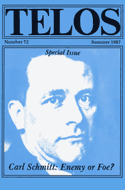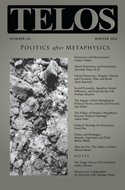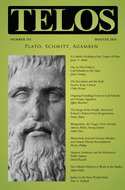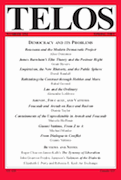By Telos Press · Friday, November 12, 2021 In today’s episode of the Telos Press Podcast, David Pan talks with Lillian Hingley about her article “The Feminine Character: The Allegory of Ibsen’s Women in Adorno’s Modernist Literary Theory” from Telos 196 (Fall 2021). An excerpt of the article appears here. In their conversation they talked about Adorno’s idea of the “feminine character” and how it relates to his broader critique of capitalist society; Adorno’s reasons for focusing on the women of Ibsen’s plays; the ways that Adorno uses the idea of allegory to interpret Ibsen’s work; how Adorno links individual tragedy to more general structures of alienation; and whether Adorno is trying imagine a world without tragedy or, alternatively, if tragedy for Adorno is just a part of human existence. If your university has an online subscription to Telos, you can read the full article at the Telos Online website. For non-subscribers, learn how your university can begin a subscription to Telos at our library recommendation page. Print copies of Telos 196 are available for purchase in our online store.
Listen to the podcast here.
Continue reading →
By Steven Knepper · Tuesday, May 2, 2017 At the beginning of his 1961 study The Death of Tragedy, George Steiner claimed that Christian “optimism” contributed to the demise of tragic drama in modernity. The ensuing chapters of The Death of Tragedy actually offer a more nuanced account, though, in which Steiner finds tragic potential in the doctrine of original sin. In subsequent essays, Steiner has doubled down on his claim that tragedy must be bleak. Indeed, he now holds up an ideal of hopeless “absolute tragedy.” In these later writings, Steiner has also continued to show interest in original sin, even claiming in a 2004 essay that original sin is the core of tragic art.
Continue reading →
By Linas Jokubaitis · Tuesday, July 15, 2014  In “The Source of the Tragic,” Carl Schmitt developed an original interpretation of The Tragedy of Hamlet, Prince of Denmark rooted in his sociological understanding of the relationship between art and contemporary politics in Shakespeare’s tragedy. According to the German jurist, one can fully understand and appreciate this masterpiece only by taking into consideration the concrete political situation at the end of the reign of the Tudor dynasty and the intense struggles for legitimacy and authority in which Shakespeare created his theatrical works. In “The Source of the Tragic,” Carl Schmitt developed an original interpretation of The Tragedy of Hamlet, Prince of Denmark rooted in his sociological understanding of the relationship between art and contemporary politics in Shakespeare’s tragedy. According to the German jurist, one can fully understand and appreciate this masterpiece only by taking into consideration the concrete political situation at the end of the reign of the Tudor dynasty and the intense struggles for legitimacy and authority in which Shakespeare created his theatrical works.
Continue reading →
By Andrea Salvatore · Monday, January 21, 2013 Andrea Salvatore’s “The Tragic Theory of Carl Schmitt” appears in Telos 161 (Winter 2012). Read the full version online at the Telos Online website, or purchase a print copy of the issue in our store.
 The present note aims to suggest a tragic reading of Carl Schmitt’s thought within a post-metaphysical perspective. The argument is divided into two parts. In the first—the meaning of the tragic dimension—I deal with Schmitt as a theorist of the tragic, that is, with the concept of tragedy that can be induced from Schmitt’s philosophy as a unitary whole. In the second part—the actuality of the tragic era—I will consider Schmitt as a pathologist of the tragic, by summarizing the diagnosis of the modernity he explicitly points out in his major works. The first thesis states that any normative and/or political order constitutively depends on a fundamental set of factual pre-conditions, whose actual enforcement in turn depends on a contextual and epochal contingency, beyond human control. If so, the range of human agency is determined by a super-human contextual contingency, to such an extent that we have to abandon the illusion of being able to decide everything. The second thesis states that the contemporary era is irretrievably characterized by a set of factual pre-conditions that makes any ultimate decision and political order unfeasible. If so, late modernity’s contingency is determined by the lack of any ordering principle and foundational reality, with the consequence that we have to abandon the illusion of being able to decide something. The awareness of the vital necessity of something lacking, and still impossible to restore, marks the tragic character of Schmitt’s thought considered in its consistent whole. The present note aims to suggest a tragic reading of Carl Schmitt’s thought within a post-metaphysical perspective. The argument is divided into two parts. In the first—the meaning of the tragic dimension—I deal with Schmitt as a theorist of the tragic, that is, with the concept of tragedy that can be induced from Schmitt’s philosophy as a unitary whole. In the second part—the actuality of the tragic era—I will consider Schmitt as a pathologist of the tragic, by summarizing the diagnosis of the modernity he explicitly points out in his major works. The first thesis states that any normative and/or political order constitutively depends on a fundamental set of factual pre-conditions, whose actual enforcement in turn depends on a contextual and epochal contingency, beyond human control. If so, the range of human agency is determined by a super-human contextual contingency, to such an extent that we have to abandon the illusion of being able to decide everything. The second thesis states that the contemporary era is irretrievably characterized by a set of factual pre-conditions that makes any ultimate decision and political order unfeasible. If so, late modernity’s contingency is determined by the lack of any ordering principle and foundational reality, with the consequence that we have to abandon the illusion of being able to decide something. The awareness of the vital necessity of something lacking, and still impossible to restore, marks the tragic character of Schmitt’s thought considered in its consistent whole.
Continue reading →
By Mark Chou · Friday, January 20, 2012 Mark Chou’s “Morgenthau, the Tragic: On Tragedy and the Transition from Scientific Man to Politics Among Nations” appears in Telos 157 (Winter 2011). Read the full version online at the TELOS Online website, or purchase a print copy of the issue here.
 When Hans J. Morgenthau first penned Scientific Man vs. Power Politics, it was his scorn of modern science or “dogmatic scientism,” as he put it, that spoke most loudly. But with the publication of Politics Among Nations several years later, his concerns had shifted, as he set about to present a rational theory of international politics. In a matter of only two years, or so it seemed, Morgenthau’s tune had changed—from a clear denunciation of science to the espousal of a nascent science of International Relations. Why did Morgenthau so vehemently decry dogmatic scientism and all that it embodied in Scientific Man, only to establish a theory of international politics that would eventually inspire the “science” of International Relations? The answer, at least the one that this article entertains, was tragedy. Using the lens of tragedy, which Morgenthau first embraced in Scientific Man, this article offers a narrative of the seemingly paradoxical transition that occurs between Scientific Man and Politics Among Nations. When Hans J. Morgenthau first penned Scientific Man vs. Power Politics, it was his scorn of modern science or “dogmatic scientism,” as he put it, that spoke most loudly. But with the publication of Politics Among Nations several years later, his concerns had shifted, as he set about to present a rational theory of international politics. In a matter of only two years, or so it seemed, Morgenthau’s tune had changed—from a clear denunciation of science to the espousal of a nascent science of International Relations. Why did Morgenthau so vehemently decry dogmatic scientism and all that it embodied in Scientific Man, only to establish a theory of international politics that would eventually inspire the “science” of International Relations? The answer, at least the one that this article entertains, was tragedy. Using the lens of tragedy, which Morgenthau first embraced in Scientific Man, this article offers a narrative of the seemingly paradoxical transition that occurs between Scientific Man and Politics Among Nations.
Continue reading →
By Alice Ormiston · Friday, April 29, 2011 Alice Ormiston’s “A Tragic Desire: Rousseau and the Modern Democratic Project” appears in Telos 154 (Spring 2011). Read the full version at TELOS Online website.
 This article begins by showing how the desire for justice in the modern democratic tradition is a manifestation of a deeper drive toward unity between nature and reason, as well as self and community. The bulk of the article explores Rousseau’s works as a demonstration that this drive towards unity is tragic in nature—it cannot be fully realized, and at the same time cannot be given up. Furthermore, Rousseau’s inability to accept this desire as tragic, his insistent attempts at creating a total unity between nature and reason, and self and community, leads to its own secondary set of tragedies in his works and his life. The tragic nature of the modern democratic orientation must be recognized and integrated, in order to avoid these secondary tragedies. This article begins by showing how the desire for justice in the modern democratic tradition is a manifestation of a deeper drive toward unity between nature and reason, as well as self and community. The bulk of the article explores Rousseau’s works as a demonstration that this drive towards unity is tragic in nature—it cannot be fully realized, and at the same time cannot be given up. Furthermore, Rousseau’s inability to accept this desire as tragic, his insistent attempts at creating a total unity between nature and reason, and self and community, leads to its own secondary set of tragedies in his works and his life. The tragic nature of the modern democratic orientation must be recognized and integrated, in order to avoid these secondary tragedies.
Continue reading →
|
|
 In “The Source of the Tragic,” Carl Schmitt developed an original interpretation of The Tragedy of Hamlet, Prince of Denmark rooted in his sociological understanding of the relationship between art and contemporary politics in Shakespeare’s tragedy. According to the German jurist, one can fully understand and appreciate this masterpiece only by taking into consideration the concrete political situation at the end of the reign of the Tudor dynasty and the intense struggles for legitimacy and authority in which Shakespeare created his theatrical works.
In “The Source of the Tragic,” Carl Schmitt developed an original interpretation of The Tragedy of Hamlet, Prince of Denmark rooted in his sociological understanding of the relationship between art and contemporary politics in Shakespeare’s tragedy. According to the German jurist, one can fully understand and appreciate this masterpiece only by taking into consideration the concrete political situation at the end of the reign of the Tudor dynasty and the intense struggles for legitimacy and authority in which Shakespeare created his theatrical works.  The present note aims to suggest a tragic reading of Carl Schmitt’s thought within a post-metaphysical perspective. The argument is divided into two parts. In the first—the meaning of the tragic dimension—I deal with Schmitt as a theorist of the tragic, that is, with the concept of tragedy that can be induced from Schmitt’s philosophy as a unitary whole. In the second part—the actuality of the tragic era—I will consider Schmitt as a pathologist of the tragic, by summarizing the diagnosis of the modernity he explicitly points out in his major works. The first thesis states that any normative and/or political order constitutively depends on a fundamental set of factual pre-conditions, whose actual enforcement in turn depends on a contextual and epochal contingency, beyond human control. If so, the range of human agency is determined by a super-human contextual contingency, to such an extent that we have to abandon the illusion of being able to decide everything. The second thesis states that the contemporary era is irretrievably characterized by a set of factual pre-conditions that makes any ultimate decision and political order unfeasible. If so, late modernity’s contingency is determined by the lack of any ordering principle and foundational reality, with the consequence that we have to abandon the illusion of being able to decide something. The awareness of the vital necessity of something lacking, and still impossible to restore, marks the tragic character of Schmitt’s thought considered in its consistent whole.
The present note aims to suggest a tragic reading of Carl Schmitt’s thought within a post-metaphysical perspective. The argument is divided into two parts. In the first—the meaning of the tragic dimension—I deal with Schmitt as a theorist of the tragic, that is, with the concept of tragedy that can be induced from Schmitt’s philosophy as a unitary whole. In the second part—the actuality of the tragic era—I will consider Schmitt as a pathologist of the tragic, by summarizing the diagnosis of the modernity he explicitly points out in his major works. The first thesis states that any normative and/or political order constitutively depends on a fundamental set of factual pre-conditions, whose actual enforcement in turn depends on a contextual and epochal contingency, beyond human control. If so, the range of human agency is determined by a super-human contextual contingency, to such an extent that we have to abandon the illusion of being able to decide everything. The second thesis states that the contemporary era is irretrievably characterized by a set of factual pre-conditions that makes any ultimate decision and political order unfeasible. If so, late modernity’s contingency is determined by the lack of any ordering principle and foundational reality, with the consequence that we have to abandon the illusion of being able to decide something. The awareness of the vital necessity of something lacking, and still impossible to restore, marks the tragic character of Schmitt’s thought considered in its consistent whole.  When Hans J. Morgenthau first penned Scientific Man vs. Power Politics, it was his scorn of modern science or “dogmatic scientism,” as he put it, that spoke most loudly. But with the publication of Politics Among Nations several years later, his concerns had shifted, as he set about to present a rational theory of international politics. In a matter of only two years, or so it seemed, Morgenthau’s tune had changed—from a clear denunciation of science to the espousal of a nascent science of International Relations. Why did Morgenthau so vehemently decry dogmatic scientism and all that it embodied in Scientific Man, only to establish a theory of international politics that would eventually inspire the “science” of International Relations? The answer, at least the one that this article entertains, was tragedy. Using the lens of tragedy, which Morgenthau first embraced in Scientific Man, this article offers a narrative of the seemingly paradoxical transition that occurs between Scientific Man and Politics Among Nations.
When Hans J. Morgenthau first penned Scientific Man vs. Power Politics, it was his scorn of modern science or “dogmatic scientism,” as he put it, that spoke most loudly. But with the publication of Politics Among Nations several years later, his concerns had shifted, as he set about to present a rational theory of international politics. In a matter of only two years, or so it seemed, Morgenthau’s tune had changed—from a clear denunciation of science to the espousal of a nascent science of International Relations. Why did Morgenthau so vehemently decry dogmatic scientism and all that it embodied in Scientific Man, only to establish a theory of international politics that would eventually inspire the “science” of International Relations? The answer, at least the one that this article entertains, was tragedy. Using the lens of tragedy, which Morgenthau first embraced in Scientific Man, this article offers a narrative of the seemingly paradoxical transition that occurs between Scientific Man and Politics Among Nations.  This article begins by showing how the desire for justice in the modern democratic tradition is a manifestation of a deeper drive toward unity between nature and reason, as well as self and community. The bulk of the article explores Rousseau’s works as a demonstration that this drive towards unity is tragic in nature—it cannot be fully realized, and at the same time cannot be given up. Furthermore, Rousseau’s inability to accept this desire as tragic, his insistent attempts at creating a total unity between nature and reason, and self and community, leads to its own secondary set of tragedies in his works and his life. The tragic nature of the modern democratic orientation must be recognized and integrated, in order to avoid these secondary tragedies.
This article begins by showing how the desire for justice in the modern democratic tradition is a manifestation of a deeper drive toward unity between nature and reason, as well as self and community. The bulk of the article explores Rousseau’s works as a demonstration that this drive towards unity is tragic in nature—it cannot be fully realized, and at the same time cannot be given up. Furthermore, Rousseau’s inability to accept this desire as tragic, his insistent attempts at creating a total unity between nature and reason, and self and community, leads to its own secondary set of tragedies in his works and his life. The tragic nature of the modern democratic orientation must be recognized and integrated, in order to avoid these secondary tragedies. 

